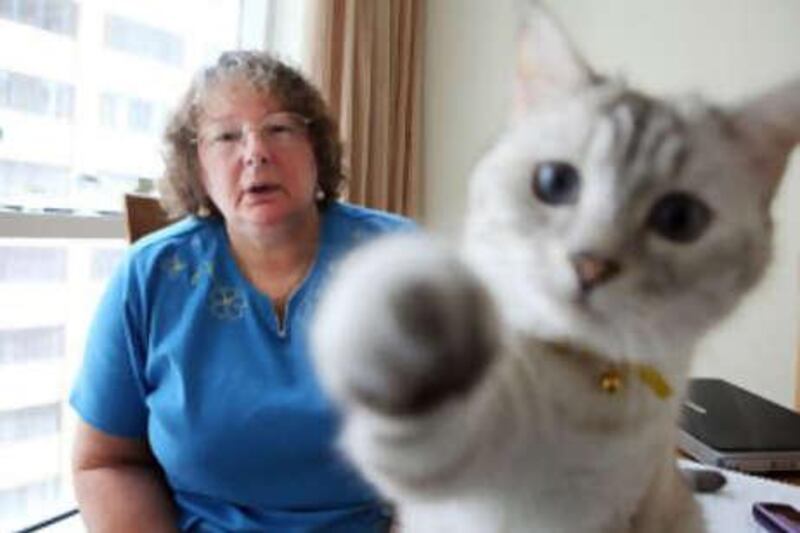Abu Dhabi // Lorraine Mohamed has been a volunteer with Feline Friends since 2007 and she remembers her introduction to the group well. She found a sick street cat outside her building, called the charity's emergency line, and they came and took the cat to the vet.
"I asked who paid for it, and she said that they do," she said, although now there is a surrender fee. "I asked if I could make a donation, so I gave her Dh100 and said whatever the vet decided would be fine. And that is how I learned about trapping, fostering and homing. I said that I could probably help out with the fostering." One Feline Friends project is their trap, neuter and release programme to keep the cat population under control. The other is their homing and fostering programme. When domestic cats are found abandoned the organisation finds homes for them. In the meantime volunteers agree to foster the cats.
The Mohameds fostered a tiny cat called Nancy. Both were fond of it but had decided they did not want cats while they lived in Abu Dhabi. "We started calling her Cleo. My husband is Egyptian - work out the connection," she said. "Then I got a phone call saying that someone would like to see Nancy. I said I'll call you back. I had a quick word with my husband who said, 'I don't think so. Nobody is going to look after her and love her like we do. Make the phone call, she is staying here.' My first foster became my first adoption. And I've done it twice more since."
Often when people leave the country they turn their animals out, convinced that they will survive. They rarely do. "They're probably dead in a week, and it's not just the case that they're going to die but how are they going to die," said Mrs Mohamed. "They'll be hit by a car and left to die or they'll be attacked by street cats and their wound will get infected and they'll die from that." Pam Greer also loves cats. When she left Canada with her husband they gave their elderly cats to their daughter, after deciding international travel and pets don't mix.
Eventually the cats died and during a trip home Ms Greer visited her daughter, who had adopted two cats from the Calgary Humane Society. "I told my husband that we had to find some way to bring cats back into our lives. I hooked up with Feline Friends and we decided to foster." They opted for kittens, convinced they would be able to find homes faster and they would not become attached to them. So far they have adopted two of their foster cats.
Many people feed street cats, but it is not the right thing to do. "If you feed a colony of cats they will get healthy and they will reproduce and then there will be too many for that area," said Ms Greer. "When you go they have to go back to foraging for food and the area probably won't sustain them." Another possibility is that people will complain about the cat population and the city will be called in.
"If there are too many then the municipality will come in and remove the cats. But we are not exactly sure what they are doing with them. Every cat with a V in its ear has been neutered and they were supposed to leave them alone, but those cats are disappearing. Still, street cats play a large role in keeping our communities healthy. "If you don't have them out there you will have all kinds of things - rodents and roaches."
Many volunteers work with Feline Friends 20 to 40 hours a week, and for all it is a labour of love. "If we don't help them who will?" asked Mrs Mohamed. "It is about respect for life." @Email:amcmeans@thenational.ae






